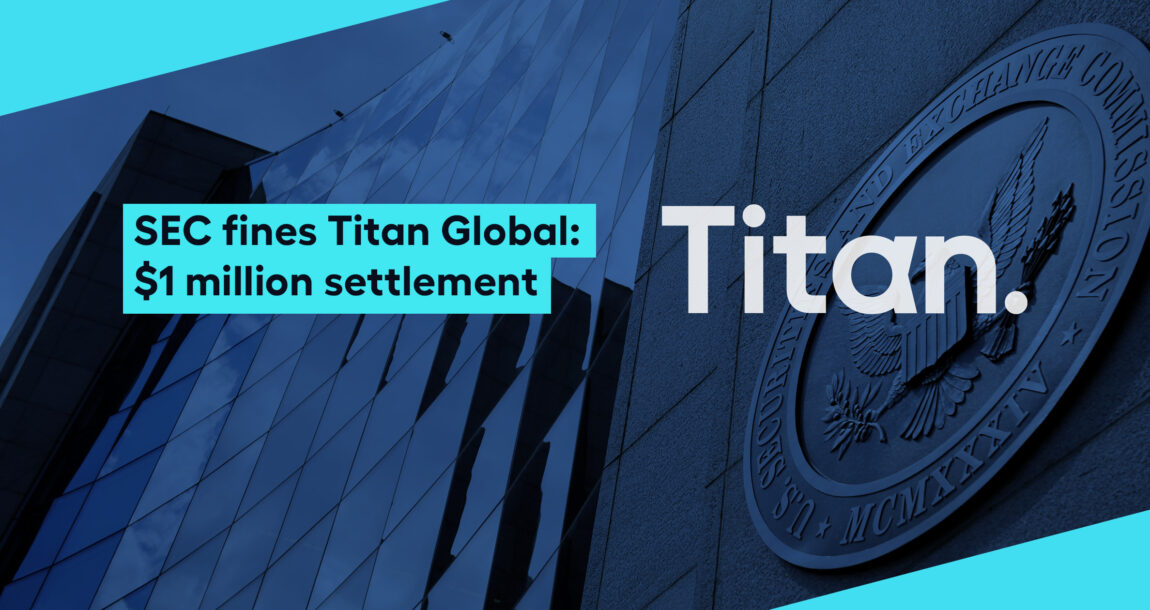SEC fines fintech advisor $1M for misleading marketing under new rules

The Securities and Exchange Commission (SEC) last week fined Titan Global Capital Management, a New York-based fintech advisor, for misleading marketing under a newly amended rule.
The SEC also charged Titan with multiple compliance failures that led to misleading disclosures about custody of clients’ crypto assets, the use of improper “hedge clauses” in client agreements, the unauthorized use of client signatures and the failure to adopt policies concerning crypto asset trading by employees.
Titan agreed to a cease-and-desist order, a censure, and to pay $192,454 in disgorgement, prejudgment interest and an $850,000 civil penalty that will be distributed to affected clients.
According to the SEC’s order, from August 2021 to October 2022, Titan, which offers multiple complex strategies to retail investors through its mobile trading app, made misleading statements on its website regarding hypothetical performance, including by advertising “annualized” performance results as high as 2,700 percent for its Titan Crypto strategy.
The order alleges that Titan’s advertisements were misleading because they failed to include material information, for example, that the hypothetical performance projections assumed that the strategy’s performance in its first three weeks would continue for an entire year.
Titan violated the marketing rule by advertising hypothetical performance metrics without having adopted and implemented required policies and procedures or taking other steps required by the rule, the SEC said.
New SEC marketing rules
The marketing rule was amended in 2020 and became effective on May 4, 2021 but had a compliance date of Nov. 4, 2022. New technology and referral practices, as well as the investment options available to consumers, led the SEC to update the marketing rule.
It created updated disclosure and recordkeeping rules, and allows advisors to use testimonials and endorsements from clients.
The SEC found that Titan (1) made conflicting disclosures to clients about how Titan custodied crypto assets; (2) included in its client advisory agreements liability disclaimer language that created the false impression that clients had waived non-waivable causes of action against Titan; and (3), contrary to representations, failed to adopt policies and procedures concerning employee personal trading in crypto assets.
Titan self-reported to the SEC staff that it failed to ensure that client signatures were obtained for certain types of transactions in client accounts and agreed to settle related charges.
“When offering and marketing complex strategies, investment advisers must ensure the accuracy of disclosures made to existing and prospective investors. The [SEC] amended the marketing rule to allow for the use of hypothetical performance metrics but only if advisers comply with requirements reasonably designed to prevent fraud,” said Osman Nawaz, chief of Enforcement’s Complex Financial Instruments Unit. “Titan’s advertisements and disclosures painted a misleading picture of certain of its strategies for investors. This action serves as a warning for all advisers to ensure compliance.”
A wake-up call
In a commentary on the Titan action, the law firm Goodwin noted that it is a good idea for advisor firms to update their policies and procedures and:
- adopt and implement policies and procedures with respect to compliance with the Marketing Rule (including with respect to hypothetical performance),
- review their disclosures (including with respect to the criteria, assumptions, risks and limitations of hypothetical performance and with respect to the use of “layered” disclosure), and
- review any hedge clause used in any investment advisory agreement or governing agreement of a private fund, particularly with respect to retail investors.
Goodwin authors added that the SEC could have brought an action against Titan under the old rule, as well as the anti-fraud provisions. Still, it indicates a renewed focus at the commission, Goodwin said, noting the phrase "retail investor" is highlighted eight times in the order.
"This case provides additional color on the SEC’s focus on advisers’ level of disclosure, as well as the prominence of such disclosure, with respect to their presentation of hypothetical performance," Goodwin lawyers wrote.






Friday Health Plan policyholders in North Carolina face deadline
Proposed mandatory long-term care insurance: A closer look at the potential negatives
Advisor News
- Geopolitical instability and risk raise fears of Black Swan scenarios
- Structured Note Investors Recover $1.28M FINRA Award Against Fidelity
- Market reports turn economic trends into a strategic edge for advisors
- SEC in ‘active and detailed’ settlement talks with accused scammer Tai Lopez
- Sketching out the golden years: new book tries to make retirement planning fun
More Advisor NewsAnnuity News
- Annexus and Americo Announce Strategic Partnership with Launch of Americo Benchmark Flex Fixed Indexed Annuity Suite
- Rethinking whether annuities are too late for older retirees
- Advising clients wanting to retire early: how annuities can bridge the gap
- F&G joins Voya’s annuity platform
- Regulators ponder how to tamp down annuity illustrations as high as 27%
More Annuity NewsHealth/Employee Benefits News
- Mark Farrah Associates Analyzed the 2024 Medical Loss Ratio and Rebates Results
- PID finds violations by Aetna Insurance
- Iowa insurance firms warn bill would make health costs rise
- ELLMAN BILL PROTECTS ACCESS TO HEALTH COVERAGE, PREVENTS DENIALS OVER PAST-DUE PREMIUMS
- Blue Cross Blue Shield of Wyoming CEO Gore announces retirement; Urbanek to take lead
More Health/Employee Benefits NewsLife Insurance News
- Jackson Earns Award for Highest Customer Service in Financial Industry for 14th Consecutive Year
- Annexus and Americo Announce Strategic Partnership with Launch of Americo Benchmark Flex Fixed Indexed Annuity Suite
- LIMRA: Individual life insurance new premium sets 2025 sales record
- How AI can drive and bridge the insurance skills gap
- Symetra Partners With Empathy to Offer Bereavement Support to Group Life Insurance Beneficiaries
More Life Insurance News